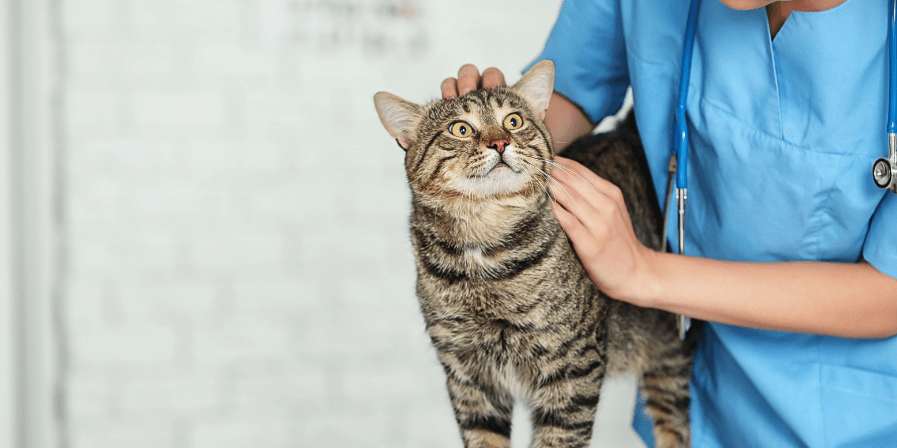Common Cat Skin Conditions

Learn about the most frequent skin issues in cats, including allergies, fungal infections, and parasites. Understand the symptoms, causes, and effective treatments to keep your feline friend comfortable and healthy. Regular check-ups and early intervention are key to managing these conditions.
1. Flea Allergy Dermatitis (FAD) Symptoms: Intense itching, red and inflamed skin, hair loss, and scabs, especially around the base of the tail and neck. Causes: Allergic reaction to flea saliva. Treatment: Regular flea control, anti-inflammatory medications, and soothing shampoos.
2. Ringworm Symptoms: Circular patches of hair loss, scaly or crusty skin, itching. Causes: Fungal infection, highly contagious. Treatment: Antifungal medications, topical ointments, thorough cleaning of the environment.
3. Miliary Dermatitis Symptoms: Small, crusty bumps over the skin, often around the neck and back. Causes: Allergies to fleas, food, or environmental factors. Treatment: Identifying and removing allergens, using anti-inflammatory medications, and applying topical treatments.
4. Eosinophilic Granuloma Complex Symptoms: Ulcers, plaques, or linear lesions on the skin, lips, and inside the mouth. Causes: Allergic reactions, often to fleas or food. Treatment: Addressing the underlying allergy, using corticosteroids or other anti-inflammatory drugs.
5. Feline Acne Symptoms: Blackheads, pustules, swelling, and redness on the chin and lips. Causes: Poor grooming, plastic bowls, stress, and hormonal imbalances. Treatment: Regular cleaning of the affected area, changing to stainless steel or ceramic bowls, and using topical treatments.
6. Atopic Dermatitis (Allergic Dermatitis) Symptoms: Itching, redness, hair loss, and recurrent skin infections. Causes: Environmental allergens such as pollen, dust mites, and mold. Treatment: Identifying and avoiding allergens, using antihistamines, corticosteroids, or other medications to manage symptoms.
7. Food Allergies Symptoms: Itching, hair loss, gastrointestinal issues, and skin infections. Causes: Allergic reaction to certain ingredients in the cat’s diet. Treatment: Elimination diet to identify the allergen, switching to hypoallergenic food.
8. Bacterial Infections (Pyoderma) Symptoms: Pustules, crusty skin, redness, and itching. Causes: Secondary infection due to skin trauma, allergies, or other conditions. Treatment: Antibiotics, topical antiseptics, and addressing the underlying cause.
9. Fungal Infections (Yeast Infections) Symptoms: Red, itchy skin, greasy or scaly patches, and a foul odor. Causes: Overgrowth of yeast, often secondary to other skin conditions. Treatment: Antifungal medications, shampoos, and addressing underlying conditions.
10. Dry Skin (Xerosis) Symptoms: Flaky, dry skin, dandruff, and itching. Causes: Poor diet, low humidity, underlying health issues. Treatment: Improving diet, using humidifiers, and moisturizing shampoos.
11. Autoimmune Skin Diseases Symptoms: Blisters, ulcers, and crusty lesions. Causes: The immune system attacking the skin cells. Treatment: Immunosuppressive drugs, regular vet monitoring.
12. Stud Tail (Supracaudal Gland Hyperplasia) Symptoms: Greasy, matted hair at the base of the tail, hair loss, and blackheads. Causes: Overactive sebaceous glands. Treatment: Regular cleaning, topical treatments, and in severe cases, neutering may help.
Prevention and General Care Tips • Regular Grooming: Brush your cat regularly to remove loose hair and dirt. • Flea Control: Use vet-recommended flea preventatives. • Healthy Diet: Feed a balanced diet to support skin health. • Clean Environment: Keep your cat’s living area clean and free from potential allergens. • Regular Vet Visits: Schedule regular check-ups to catch any skin issues early. If you notice any unusual changes in your cat’s skin or behavior, consult your veterinarian for a proper diagnosis and treatment plan.
FAQ’s:
1.Are cat skin conditions contagious to humans? Some conditions, like ringworm, are zoonotic and can be transmitted to humans. It is important to practice good hygiene and seek veterinary care if you suspect a contagious condition.
2. Can stress cause skin problems in cats? Yes, stress can lead to over-grooming and exacerbate skin conditions. Providing a calm and enriched environment can help reduce stress-related skin issues. For veterinary clinic in Gurgaon, Delhi and Noida, please give us a call on 9311560101 or log on to dccpets.in.


 How can we help?
How can we help?